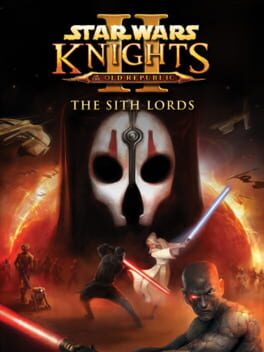The inaugural title of Obsidian Entertainment, the long shadow of Western RPGs in the new millennium, remains the clearest articulation of the ethos. Itself a motley resurrection of "classical" or "hardcore" RPG sensibilities within a changed industry, Obisidan here in the sequel to the apex effort of the BioWare Method consolidates their own: 1) a (usually extremely wordy) interrogation of the themes and presumptions of an existing RPG, within or without the particular IP, 2) the contrastingly uneventful maintenance of combat mechanics, 3) complicated but ultimately modular instances of choice and consequence that 4) culminate in the final confrontation with the central idea of all Obsidan RPGS: choice is difficult, but one must choose. Says Ron Perlman: war, war never changes. Adds Ulysses: but men do, through the roads they walk.
To the chorus adds Kreia: "Apathy is death". Kreia, is herself a predecessor to Ulysses, both not only representing a respectable Obsidian archetype but an Avellone one: the slightly unhinged and endlessly talkative philosopher whose by-design faulty philosophy is a ruse, an unassuming entry into the truly thoughtful aspects of Obsidian's games implicit in those 4 qualities cataloged above, an almost metacritical concern-cum-obsession regarding the absurd state of the world those philosophers inhabit. Often is this game brought up in sneering comparison against The Last Jedi: how KOTOR 2 did subversion right, and so on. The impulse behind those thoroughly misguided exercises, I believe, lies in this quality, though those very critics often mistake Obsidian's almost crazed vulnerability with some elevated intellectualism.
On the other hand, while Kreia's ideas are nonsense, the shallow political reading of her notorious withholding of charity to the panhandlers of Nar Shaddaa makes the same mistake as those Last Jedi critics. Kreia, and by extension KOTOR 2 does not operate and therefore does not hold up in that register. Kreia is not a space libertarian but a wounded failure whose ideas barely mask a burning resentment at the times, the Jedi, the Sith, all the cruelties of the worlds operating in seemingly mysterious and unknowable ways - the Force. Her helplessness at the face of it all is the center of it, and both her role as mentor and menace is not a sign of some enlightened, endlessly complex hero-villain-martyr, but a hurt and confused woman who found someone just as hurt and confused, and was eager to read that mutual suffering as a secret and unimaginable power.
Too bad about Malachor V, the worst level ever made. But the restoration of this game's reputation in recent years do not seem to me a fluke, and that incomplete quality only enhances the coarsesness of surviving vision. Why use beautiful words to express ugliness?
To the chorus adds Kreia: "Apathy is death". Kreia, is herself a predecessor to Ulysses, both not only representing a respectable Obsidian archetype but an Avellone one: the slightly unhinged and endlessly talkative philosopher whose by-design faulty philosophy is a ruse, an unassuming entry into the truly thoughtful aspects of Obsidian's games implicit in those 4 qualities cataloged above, an almost metacritical concern-cum-obsession regarding the absurd state of the world those philosophers inhabit. Often is this game brought up in sneering comparison against The Last Jedi: how KOTOR 2 did subversion right, and so on. The impulse behind those thoroughly misguided exercises, I believe, lies in this quality, though those very critics often mistake Obsidian's almost crazed vulnerability with some elevated intellectualism.
On the other hand, while Kreia's ideas are nonsense, the shallow political reading of her notorious withholding of charity to the panhandlers of Nar Shaddaa makes the same mistake as those Last Jedi critics. Kreia, and by extension KOTOR 2 does not operate and therefore does not hold up in that register. Kreia is not a space libertarian but a wounded failure whose ideas barely mask a burning resentment at the times, the Jedi, the Sith, all the cruelties of the worlds operating in seemingly mysterious and unknowable ways - the Force. Her helplessness at the face of it all is the center of it, and both her role as mentor and menace is not a sign of some enlightened, endlessly complex hero-villain-martyr, but a hurt and confused woman who found someone just as hurt and confused, and was eager to read that mutual suffering as a secret and unimaginable power.
Too bad about Malachor V, the worst level ever made. But the restoration of this game's reputation in recent years do not seem to me a fluke, and that incomplete quality only enhances the coarsesness of surviving vision. Why use beautiful words to express ugliness?
